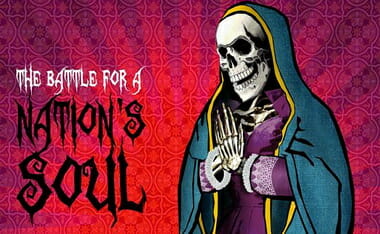By Federico Cornetto A talented tattooist transform his client’s tattoo of his girlfriend into the helmet of a fearsome samurai. Trung Tadashi, 41, from Ho Chi Minh City, Vietnam, covered up the unwanted ink that showed a young lady’s face. He captured the process on film as he meticulously worked to hide the piece.
tattoo


Tattoos and the Bible
Leviticus 19:28 states: “You shall not make any cuts in your body for the dead, nor make any tattoo marks on yourselves…” (NASB). Is this a forbiddance of getting a tattoo? Or was this written for a specific people, in a specific time, with a specific example in mind (God’s mind). Lets see what some commentators have to say on what this example would be that caused God to forbid marking or engraving on one’s body.
Matthew Henry’s Commentary: v. 28“They shall make cuts or prints in their flesh for the dead; for the heathen did so to pacify the infernal deities…”
New Bible Commentary: vv. 29-31 “The main focus of this section is to exclude rites and practices associated with pagan, Canaanite religion, particularly those which were physically or morally disfiguring. Abuse of the body in the name of religion is a wide spread human aberration…”
The International Bible Commentary: v. 28 “Cutting the flesh was a feature of the worship of Melqart (Baal in Old Testament)…. There are various explanations of this self-disfigurement which have been advanced: to provide blood for a departed spirit, to render mourners unrecognizable to departed spirits, to drive away the spirits by the life-force resident in the blood, and so on…”
The point here is that if one were to interpret this in a wooden literal sense that applies to today’s tattooing of the body for non-religious purposes, then one would apply verse 27 to getting “bowl-cuts.” For we read: “You shall not round off the side-growth of your heads, nor harm the edges of your beard” (NASB).
Matthew Henry Commentary: “Those that worshipped the hosts of heaven, in honor of them, cut their hair so that their heads might resemble the celestial globe; but, as the custom was foolish in itself, so being done with respect to their false gods, it was idolatrous.”
Yes, Matthew Henry just called the bowl-cut “foolish,” but when done for religious purposes, it is wrong. As with the tattoo, if done for spiritual purposes, it is forbidden. If done for personal reasons, I see no harm. If I am wrong, I suspect that when one receives their glorified body, it will be washed clean with the blood of Christ. Because only then will we be perfect, the creation God originally intended.
I see no clear precedence in the Bible for not getting a tattoo if done for non-religious purposes. If one were to interpret this as following the law, a maelstrom would soon follow; not to mention the book of Galatians being thrown out the window.

Paganism On FULL Display In Magneto
I bet the Demons are having a field day with this guy! Is he secretly hoping for the fall of Israel? Who knows, but I would guess he is not very conservative in his views.
- Third annual tattoo convention is taking place over two days in Tel Aviv;
- Among attendees is Magneto, from Berlin, whose entire face is covered in inkings, including his eyeballs.


Glorifying An Amoral, Non-Judging, Death Cult Saint Of Last Resort
THE saint of last resort is amoral and does not judge.
More than any other reason for Santa Muerte’s enthusiastic support among those in need, her unwillingness to stand in judgment stands out.
“Since she’s not an official Christian saint, you can ask her for things that maybe you wouldn’t otherwise ask a canonised saint for,” Professor Chesnut, author of Devoted to Death: Santa Muerte, the Skeleton Saint, told NBC last year.
“She’s got a reputation as a very prompt miracle worker. That, I would say, is the number one reason for her mushrooming cult.
(See more in the linked story below as well as here.)
Someone I know got a tattoo recently and I couldn’t join the chorus of praises bestowed on him.
In fact, I posted the following under his pictures of the tattoo:
Too bad. All I could think of is this:
All you have to do in Google images is type in “gruesome killing by drug cartel,” and you will vividly see what worshiping death gets you… but here in America, we commercialize it and support it via “pop-culture.” Sorry I couldn’t *pat* you on the back Chris, but many along the border of Mexico would shake their head at this type of stuff. Shake their head that American’s safe in their suburban areas do not at-the-least reject images that are used in a cult of death that affect soo many lives in Mexico.
But your real concerns are your hatred of Ronald Reagan, as you have made clear multiple times on my FB. You have emphasized the important fight against evil… not symbols used to behead women and children… you know… Republicans.
One story I followed was a brave young woman who stood up to evil she knew she could not succeed against, but took the job anyway!
One policeman was murdered during Gandara’s first week on the job. By the time she became chief, the entire force of eight patrolmen had either been killed or fled. She was the sole law enforcement representative in a Juarez valley town that was part of the war between competing drug cartels for access routes into the U.S.
Relatives feared for her safety and urged Gandara to keep a low profile. But she refused, posing with her rifle for newspaper interviews. Then, at 6 a.m. on December 23, 10 gunmen pulled up to her residence, dragged her out of the house and set the home on fire. She has not been seen or heard from since….
(Fox)

Wo to them that call evil good. Though some limit this statement to judges, yet if it be carefully examined, we shall easily learn from the whole context that it is general; for, having a little before reproved those who cannot listen to any warnings, he now proceeds with the same reproof. It is evident that men of this sort have always some excuse to plead, and some way of imposing on themselves; and, therefore, there is no end to their reproachful language, when their crimes are brought to light. But here he particularly reproves the insolence of those who endeavour to overthrow all distinction between good and evil.
The preposition ל (lamed), prefixed to the words good and evil, is equivalent to Of; and therefore the meaning is, They who say OF evil, It is good, and OF good, It is evil; that is, they who by vain hypocrisy conceal, excuse, and disguise wicked actions, as if they would change the nature of everything by their sophistical arguments, but who, on the contrary deface good actions by their calumnies. These things are almost always joined together, for every one in whom the fear of God dwells is restrained both by conscience and by modesty from venturing to apologize for his sins, or to condemn what is good and right; but they who have not this fear do not hesitate with the same impudence to commend what is bad and to condemn what is good; which is a proof of desperate wickedness.
This statement may be applied to various cases; for if a wo is here pronounced even on private individuals, when they say of evil that it is good, and of good that it is evil, how much more on those who have been raised to any elevated rank, and discharge a public office, whose duty it is to defend what is right and honourable! But he addresses a general reproof to all who flatter themselves in what is evil, and who, through the hatred which they bear to virtue, condemn what is done aright; and not only so, but who, by the subterfuges which they employ for the sake of concealing their own enormities, harden themselves in wickedness. Such persons, the Prophet tells us, act as if they would change light into darkness, and sweet into bitter; by which he means that their folly is monstrous, for it would tend to confound and destroy all the principles of nature.
John Calvin and William Pringle, Commentary on the Book of the Prophet Isaiah, vol. 1 (Bellingham, WA: Logos Bible Software, 2010), 186–187.
